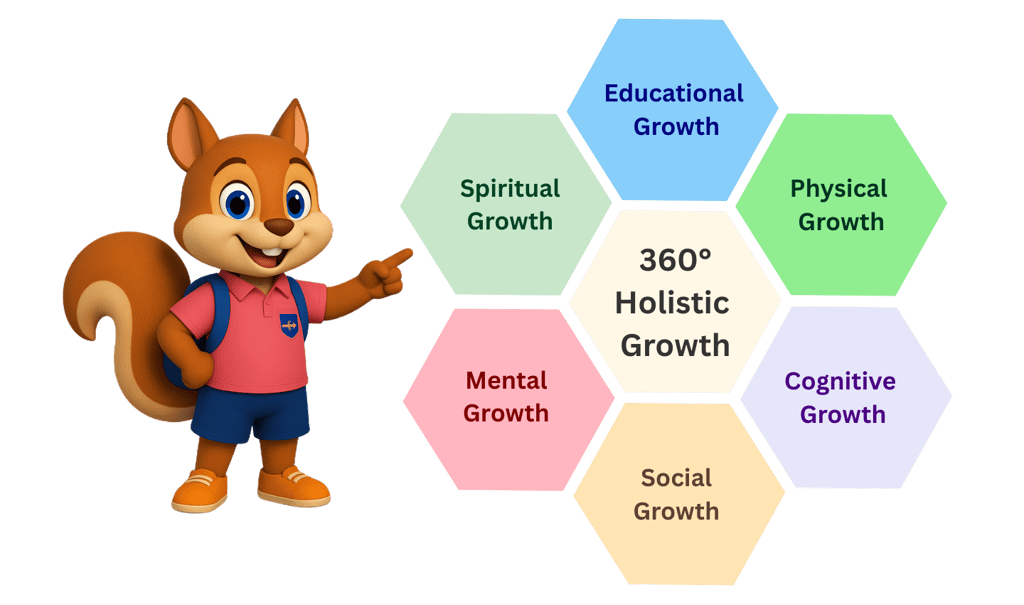Early Childhood Development: Milestones, Skills, and Nurturing Your Child’s Potential
From little steps to big milestones, discover how your child grows cognitively, emotionally, socially, physically, and even spiritually between ages 2–6. 💡 Learn how to spot strengths, support challenges, and nurture your child’s full potential!
360° GROWTH
Chirag Sakariya
8/29/20253 min read


1. Milestones to Expect at Ages 2–6
Children develop at their own pace, but certain key milestones serve as helpful guides:
Age 2–3
Language: Vocabulary grows from 50 words to over 200. Simple sentences begin.
Motor skills: Can run, kick a ball, climb stairs with support.
Cognitive: Recognizes shapes and colors; begins imaginative play.
Social/Emotional: Starts showing independence; expresses emotions clearly.
Spiritual: Begins showing curiosity about nature, people, and surroundings; may ask simple questions about life and the world.
Age 3–4
Language: Uses sentences of 4–5 words; asks many “why” questions.
Motor skills: Can ride a tricycle, copy shapes, and dress with help.
Cognitive: Begins understanding concepts like “same” and “different”; enjoys simple puzzles.
Social/Emotional: Engages in cooperative play; shows empathy and understanding of rules.
Spiritual: Begins understanding values like kindness and sharing; shows wonder at natural phenomena.
Age 4–5
Language: Speaks clearly; tells short stories; understands time concepts like “yesterday” and “tomorrow.”
Motor skills: Can hop, skip, catch a ball, and draw simple shapes.
Cognitive: Starts counting, recognizing letters, and understanding sequences.
Social/Emotional: Can share, negotiate, and manage emotions with guidance.
Spiritual: Begins forming a sense of right and wrong; may show interest in stories about morals, traditions, or family values.
Age 5–6
Language: Reads simple words; communicates complex ideas; expands vocabulary.
Motor skills: Can write letters, use scissors, and perform basic sports skills.
Cognitive: Understands numbers, patterns, and basic problem-solving.
Social/Emotional: Shows teamwork, responsibility, and independence in daily activities.
Spiritual: Demonstrates empathy, gratitude, and respect for others; may start reflecting on simple questions about life, fairness, and purpose.
2. Cognitive, Social, Emotional, Motor, and Spiritual Skill Development
Cognitive Skills
Cognitive development refers to a child’s ability to think, learn, and problem-solve.
Activities like puzzles, storytelling, and counting games stimulate critical thinking.
Encourage curiosity by answering questions, exploring nature, or experimenting with simple science activities.
Social Skills
Social development focuses on interacting with peers and adults.
Teach sharing, taking turns, and empathy through group activities.
Encourage cooperative play and family bonding to enhance social awareness.
Emotional Skills
Emotional growth involves understanding and expressing feelings.
Help children label emotions (“I see you are sad”) and practice coping strategies.
Praise efforts rather than results to build confidence and resilience.
Motor Skills
Motor skills include gross and fine movements:
Gross motor: Running, jumping, climbing, balancing.
Fine motor: Drawing, cutting, buttoning, building with blocks.
Offer toys and activities that challenge coordination, strength, and precision.
Spiritual Development
Spiritual growth in early childhood is about nurturing values, empathy, mindfulness, and wonder.
Encourage gratitude and kindness in daily routines.
Introduce stories, rituals, or songs that teach morals and respect.
Promote connection with nature and awareness of the world around them.
3. How to Identify Early Learning Strengths and Challenges
Recognizing your child’s strengths and challenges early can make a big difference:
Observe patterns: Note areas where your child excels—creativity, problem-solving, empathy, or physical coordination.
Look for delays: If your child struggles with basic milestones (e.g., speaking, walking, or social interaction), consider seeking guidance from a pediatrician or early childhood specialist.
Celebrate uniqueness: Every child develops differently; strengths in one area can compensate for challenges in another.
Create supportive environments: Use play, learning activities, and routine to nurture growth and confidence.
4. Tips for Supporting Early Development at Home
Encourage daily play and exploration.
Read together to boost language, cognitive, and spiritual awareness.
Include activities that develop motor skills, like drawing, building blocks, or obstacle courses.
Teach emotional and spiritual expression through role play, mindfulness, and discussions about values.
Engage in social opportunities with peers, family gatherings, or community events.
Encourage gratitude and reflection, like noticing kindness or caring for nature and animals.
Final Thoughts
Early childhood development is a journey filled with wonder, curiosity, growth, and moral learning. By understanding milestones, nurturing cognitive, social, emotional, motor, and spiritual skills, and supporting your child’s unique strengths, you can help lay a strong foundation for lifelong learning, empathy, and well-being.
Remember: Every child is unique, and their journey is their own. Celebrate achievements, guide them through challenges, and enjoy the magical world of early childhood together.
Explore the world of 360° Juniors
360°Juniors_Nirmalaroad_Rajkot
9/3, Balmukund plot, Nirmalaroad, Rajkot - 360007
Mo. 95123 66 360
Mail : info@360juniors.com
© 2025. All rights reserved
An initiative of BBC(P)Ltd.

